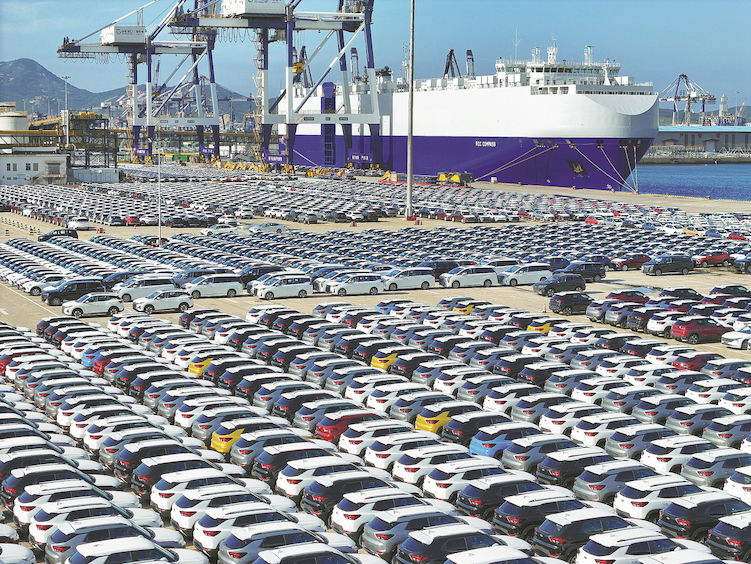China has urged the European Union to reconsider tariffs on Chinese electric vehicles, saying it has gone in the “wrong direction” to protect local carmakers.
The European Commission’s announcement on Wednesday that it would impose extra duties of up to 38.1% on imported Chinese electric cars from July.
China’s state news agency Xinhua noted on Thursday that European nations such as Germany. Hungary and Sweden opposed the decision, while European carmakers such as BMW, Mercedes-Benz and Volkswagen are keen to cool the situation in a bid to change course.
ALSO SEE: As EU Eyes Tariffs, European States Chase China EV Factories
Industry insiders say both Europe and China have reasons for wanting to strike a deal in the months ahead to avoid the addition of billions of dollars in new costs for Chinese electric car makers, as the EU process allows for review.
China said it would take measures to safeguard its interests after the European Commission announced its position.
“In light of their economic structure and sheer size, China and the EU are best served by teaming up on major economic and trade issues,” Xinhua said in a commentary.
Brussels seemed to have left some room for the two sides to continue their consultations to find a solution and avoid the worst scenario, the Xinhua commentary added.
“It is hoped the EU will make some serious reconsideration and stop going further in the wrong direction,” it said.
Beijing has rejected the EU and US argument that China’s EV industry is running at a degree of overcapacity that threatens overseas automakers through subsidized exports. It says tariffs will slow the uptake of electric vehicles, endanger climate-change goals and push costs higher for consumers.
The EU move comes less than a month after Washington revealed plans to quadruple duties for Chinese EVs to 100%.
Brussels said it also would combat Chinese subsidies with additional tariffs ranging from 17.4% for BYD to 38.1% for SAIC, on top of the standard 10% car duty. That takes the highest overall rate to nearly 50%.
SAIC ‘deeply concerned’
State-owned SAIC, which counts on joint ventures with Volkswagen and General Motors to be China’s largest automaker, said on Thursday it was deeply concerned by the tariffs.
SAIC has been China’s biggest automaker for nearly two decades but its sales have come under pressure and it has been working to reduce headcount.
The EU has made clear that European regulators would view loans from Chinese state-owned banks and government ownership as subsidies subject to additional tariffs.
In a sign China has little intention of dialling back on support, the government of the city of Shenzhen on Thursday announced measures to encourage the integration of new energy vehicles with the electric grid, including subsidies of up to 15 million yuan ($2 million) for each vehicle-to-grid project.
China carmakers shares mixed
China’s auto industry, a mix of state-owned and private firms, has cost advantages over foreign competitors in part because of government subsidies and the nation’s dominance of battery-minerals refining, analysts say.
But the hyper-competition in China’s EV market, the world’s largest, has also driven companies to innovate in ways that have brought down costs.
The EU provisional duties are set to apply by July 4, with the investigation due to continue until November 2, when definitive duties, typically for five years, could be imposed.
Chinese EV maker stocks mostly shrugged off the news, which was expected. The Hong Kong-listed shares of BYD surged more than 7%, on track for their biggest one-day percentage gain since November 2022.
“The EU tariff hike result is slightly positive for BYD vs our previous tariff expectation of 30%, which improves BYD’s export growth visibility into 2Q/3Q24,” Citi said in a research note.
Geely Auto climbed more than 3%, Leap Motor surged 3% and Great Wall Motor’s Hong Kong shares eased 1.2%. In Shanghai, shares of SAIC Motor fell 1.6%.
Joe Mazur, senior analyst at research consultancy Trivium China, said Chinese EV makers would be forced to pass along some of the cost increases to consumers.
“But it’s by no means a death blow to the to the Chinese EV industry in Europe,” he said.
Chinese automakers have charged more for exports than they have in their home market, offering some protection from the tariffs. BYD, for example, charges more than double — sometimes nearly triple — the price it gets for three key models in China.
EU carmakers dependent on China sales
While European automakers are being challenged by an influx of lower-cost EVs from Chinese rivals, there is virtually no support for tariffs from the continent’s auto industry.
Some of the biggest opponents include Europe’s largest automakers such as BMW, Volkswagen, Stellantis, and Mercedes Benz.
German automakers in particular are heavily dependent on sales in China and fear retribution from Beijing. European auto firms also import their own Chinese-made vehicles.
Shares in some of Europe’s biggest carmakers – which make a big portion of their sales in China – fell on Wednesday due to fears of Chinese retaliation.
- Reuters with additional editing by Jim Pollard
ALSO SEE:
As EU Eyes Tariffs, European States Chase China EV Factories
Biden Ramps US Tariffs on Chinese EVs, Metals, PV Cells, Chips
EU Vows to Stem ‘Unfair Competition’ With New China Subsidy Probe
China’s Free Trade Olive Branch to EU Amid Subsidy Probes
BYD’s First Vehicle Charter Sets Sail Loaded With 5,000 EVs
Chinese Outbound EV Investment ‘Hit Record High in 2023’
Biden Orders Probe Into Data Security Risks From Chinese EVs
























